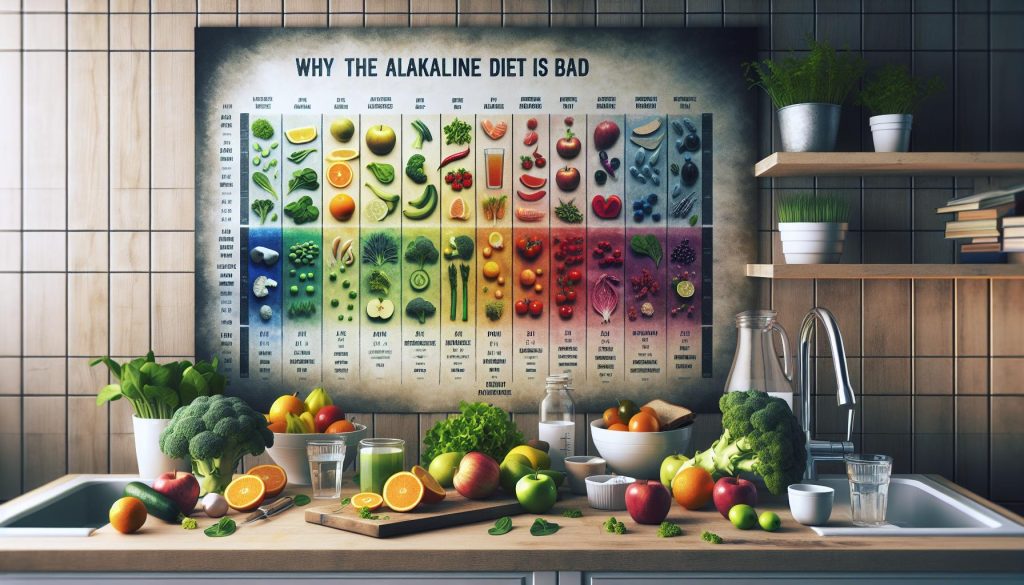
The Alkaline Diet: Unpacking its Unappealing Aspects
This piece will attempt to unravel the puzzle that is “Why the Alkaline Diet is Bad”. While the Alkaline Diet has gained fame and a fair share of followers based on its promise to help maintain the body’s pH balance, there are those who believe its repercussions could be detrimental. Like the push and pull of a seesaw, this diet harbors a blend of benefits and potential downfalls. As we delve deeper into the anatomy of the Alkaline Diet, you’ll get a clearer picture of the nutritional pitfalls and fallacies it poses.
Unraveling the Alkaline Diet: A Quick Overview
Feeding on the fears of acid in the modern diet, the Alkaline Diet makes a persuasive pitch: consume alkaline foods like leafy vegetables and avoid acid-forming substances such as meats, dairy, and grains to maintain the body’s pH balance. However, let’s puncture this pitch-perfect perspective with a pinprick of reality. Our bodies are well-equipped to manage the flux of pH. The tranquil truth is that it manages the acidic or alkaline nature of our food intake through complex biological mechanisms, keeping our pH levels in a narrow, healthy band.
Dissecting the Diet Design
The Alkaline Diet leans heavily towards high alkaline foods, meaning more fruits and vegetables in your meals. This in itself is a commendable culinary concept. However, the reason behind it, the idea that food can drastically alter your body’s pH, is questionable. Our bodies are more resilient than the diet might have you believe.
Unhealthy Underpinnings: The Alkaline Diet’s Downfalls
A diet should provide nutrients and energy to sustain our bodies, but the Alkaline Diet stretches these standards. In banishing essential food categories such as dairy and meat from your plate, it leaves you lacking vital vitamins, amino acids, and minerals, like calcium and iron, the building blocks of life. Like a house without a strong foundation, our bodies cannot function optimally on such a diet.
The Pitfall of Protein Deficiency
The Alkaline Diet casts aside nitrate-rich proteins like meat and dairy, causing an unplanned protein retreat. This can lead to muscle loss and immune dysfunction, much like a ship left vulnerable in a storm due to its anchor being cast away.
Cut Through The Confusion: The Contradictions of the Alkaline Diet
A conundrum cloaked in catchy claims, the Alkaline Diet is not as clear-cut as it first appears. It sneaks in several oversimplifications and misinterpretations. For example, the myth that lemons are alkaline is often propagated. In reality, although they are high in citric acid and potent to the palate, they’re purported to have an alkalising effect within the body due to their low sugar content and high alkaline mineral content.
The Puzzling Paradox of pH
There is an element of the Alkaline Diet that might leave you at a loss: the variability of pH. The pH varies throughout the body, making it hard to homogenise it all. Circumvent this confusion by understanding that the notion of tweaking the body’s pH through diet alone is a nutritional fallacy, like trying to turn a wave into a ripple.
Bidding Adieu to the Alkaline Diet’s Assumptions
Wrapping up, it’s clear that the Alkaline Diet’s attractiveness is anchored in misconceptions. Measures to maintain your pH levels can be out of culinary control, and heavily alkaline diets can rob you of essential nutrients. The Alkaline Diet’s allure lies in its simplicity—eat this, not that —but it’s essential to note that our bodies are far from simple, and a one-size-fits-all approach to nutrition seldom suffices.
Frequently Asked Questions
1. Is the Alkaline Diet harmful?
Although not inherently harmful, the Alkaline Diet’s restrictions can lead to nutrient deficiencies in the long term due to the exclusion of essential food groups.
2. Why can’t the alkaline diet affect my body’s pH?
The body has its own robust mechanisms for maintaining pH balance, such as breathing and kidney function.
3. Does the Alkaline Diet prevent diseases?
There is currently no proven link between the Alkaline Diet and disease prevention. It is always best to follow a balanced, varied diet.
4. Can the Alkaline Diet cause nutritional deficiencies?
Yes, restrictions in specific food groups may lead to a lack of proteins, calcium, and other essential nutrients.
5. Can I consume meat and dairy on the Alkaline Diet?
The Alkaline Diet encourages limiting meat and dairy intake due to their perceived acid-forming properties. This can lead to protein and calcium deficiency. It is advised to follow a balanced diet that includes all food groups.



